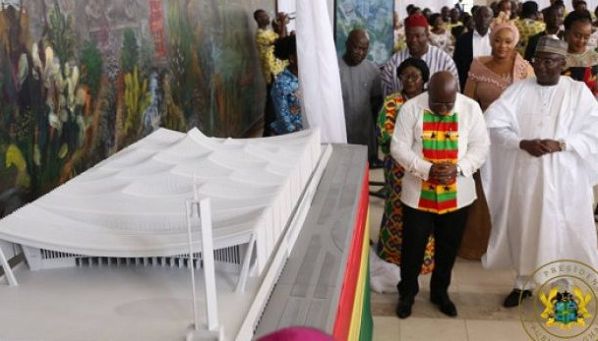
National Cathedral, Hajj Board do not breach constitution - Supreme Court
The Supreme Court has endorsed the state’s involvement in the construction of a National Cathedral and the establishment of a Hajj Board to coordinate the pilgrimage of Muslims to Mecca.
In a unanimous decision yesterday, a seven-member panel of the court dismissed a suit challenging the two acts by the state on the basis that the plaintiff, Mr James Kwabena Bomfeh, failed to raise any genuine case for constitutional interpretation or enforcement by the court.
Bomfeh, the acting General Secretary of the Convention People’s Party (CPP), had invoked the original jurisdiction of the apex court, arguing that Ghana was a secular state and, therefore, it was unconstitutional for the state to lead the construction of the National Cathedral and also establish the Hajj Board.
No preferential treatment
But, according to the court, the state had not breached any provision of the 1992 Constitution because the construction of a National Cathedral and the establishment of a Hajj Board did not mean that the state had given preferential treatment to Christianity or Islam, neither did it amount to excessive entanglement in religion by the state.
It also held that the two acts were not a violation of the 1992 Constitution, as they had not prevented anybody from practising his or her religion, neither was it discrimination against any religion.
Rather, the apex court was of the view that the state-sponsored National Cathedral and Hajj Board were moves to promote social cohesion and unity in the country, since more than 88 per cent of the country’s population are Christians and Muslims.
“The Constitution does not prohibit the state from collaborating with religious groups; it rather prohibits the imposition of a religion by the state,’’ it held.
The judgement was read by the presiding justice, Mrs Justice Sophia Adinyira.
The other members of the panel were Justices Jones Dotse, Anin Yeboah, Sule Gbadegbe, Anthony A. Benin and Vida Akoto-Bamfo.
Bomfeh’s case
Mr Bomfeh, through his lawyer, Dr Basit Aziz Bamba, had argued that the state-led National Cathedral and the Hajj Board were unconstitutional because it showed that the country had purposely aided, sponsored, endorsed and offered special treatment to Christianity and Islam, a clear violation of articles 17 (2), 35 (5) and 37(2) of the 1992 Constitution.
Article 17 (2) frowns on discrimination of people based on religion, while articles 35 (5) and 37 (2) talk about the directive principle of state policy and how the state must prohibit discrimination on all grounds, including religion, and the need for the state to ensure that every citizen enjoys equal right.
The plaintiff wanted the court to give an interpretation on the above constitutional provisions and make certain declarations in support of his arguments.
It was his case that based on the Constitution, the state must not offer any support to any religion, but in the event it wanted to offer such support, the support must be given to all religions and not just Christianity and Islam.
Also, it was his contention that a law must be passed by Parliament to back any support the state gave to any religion.
“Ghana is a secular state and must, therefore, show indifference to religion and must not confer benefits on any specific religion,’’ counsel argued.
The plaintiff also wanted the court to enforce articles 258 and 265 of the Constitution, which deal with the Lands Commission, in support of its other argument that President Nana Addo Dankwa Akufo-Addo acted unlawfully in allocating the land for the construction of the National Cathedral.
A-G’s case
The state, represented by a Deputy Attorney-General (A-G), Mr Godfred Yeboah Dame, argued that the plaintiff had failed to raise a case for constitutional interpretation or enforcement and, therefore, failed to invoke the jurisdiction of the court.
He further argued that the plaintiff had misconstrued the idea of secularism because secularism did not mean that the state should “completely disregard or ignore the religiosity of the people in the taking and implementation of policy decisions for a just and free society”.
Court’s judgement
In its judgement, the court sided with the A-G and held that the plaintiff, indeed, failed to invoke the court’s jurisdiction to interpret or enforce provisions of the Constitution.
According to the court, all the constitutional provisions on which the plaintiff wanted interpretation were clear and unambiguous.
It quoted copiously from the 1992 Constitution to show that articles 17, 35, 37, 258 and 265 were clear and needed no interpretation.
“We do not find any ambiguity in the constitutional provisions. The words are explanatory, simple and easy to appreciate,’’ it held.
The court was also of the view that President Akufo-Addo did not breach the Constitution in allocating the land for the construction of the National Cathedral, since the Constitution vests all public lands in the President.
“Plaintiff has failed to demonstrate that the allocation was done without consultation with the Lands Commission,’’ it held.
With regard to whether or not the National Cathedral and the Hajj Board projected Christianity and Islam over other religions, the court held that that was not the case.
“Lending a helping hand to a religion does not mean the state has projected that religion over others,’’ it added.
Background
President Nana Addo Dankwa Akufo-Addo cut the sod for the construction of the National Cathedral on March 6, 2017 as part of events that marked Ghana’s 60th independence anniversary.
Funding for the 5,000-seater edifice is to be sourced from individuals within the Christian community.
Plans by the government to demolish houses, including those housing judges, on the land around Ridge in Accra to make way for the construction of the cathedral generated a debate.
Writer’s email:
